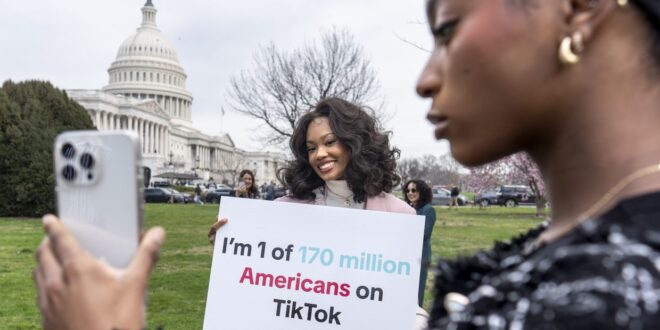The fate of an app used by 170 million Americans is now in the hands of 100 senators.
Even before the House passed a measure, 352 to 65, on Wednesday to ban TikTok unless its Chinese owner divests it, the short-video app had turned its lobbying efforts to the Senate, where many a previous legislative juggernaut has gone to die.
“We will continue to do all we can, including exercising our legal rights, to protect this amazing platform that we have built with you,” TikTok chief executive officer Shou Zi Chew said Wednesday evening in a video posted to TikTok and X, formerly Twitter. “I encourage you to keep sharing your stories. Share them with your friends, share them with your family, share them with your senators.”
The legislation barreled through the House, going from introduction to passage in just over a week, with most Republicans and Democrats united in concern about its Chinese parent company, ByteDance Ltd. President Joe Biden has said he will sign the bill. But first it has to get past a gauntlet of concerns and potential revisions that could slow, stall or kill it.
Congress has a dismal record in turning members’ denunciations of perceived tech abuses into law. Vows to enact legislation to protect children online, bolster antitrust authority, ensure data privacy and regulate artificial intelligence have all fallen short. Now, senators are hearing from the scores of lobbyists on TikTok’s payroll, including former senators like Republican Trent Lott.
So far, Senate Majority Leader Chuck Schumer has committed only to reviewing the TikTok legislation when it comes over from the House.
First stop
The first stop for the bill is likely be the Commerce Committee. Senator Maria Cantwell of Washington, its chairman, said in a statement that she’s “very concerned” about Americans’ data and attempts by foreign adversaries to build “backdoors” into apps like TikTok. But she stopped short of committing to take up the House bill, saying she would speak with her colleagues “to find a path forward that is constitutional and protects civil liberties”.
Some senators who are at odds on many issues – from Pennsylvania Democrat John Fetterman to Missouri Republican Josh Hawley – say they’re eager to vote for the House-passed legislation, citing what they say are risks to national security. Senators Mark Warner and Marco Rubio, the chair and vice chair of the Senate Intelligence Committee, said they would work to get the bill through the chamber and signed into law.
But other senators, such as Kentucky Republican Rand Paul, have said they will do everything they can to slow the bill’s passage, including forcing a week’s delay if the measure is brought to the floor. Paul has said he thinks it violates the Constitution and would fail in court if signed into law.
The Senate also includes frequent TikTok users like Democratic Senator Cory Booker of New Jersey, who said Congress should pass broader legislation protecting data and privacy on all social networks.
Some Republican supporters share former President Donald Trump’s newfound opposition to forcing a TikTok sale. Trump, who as president signed an executive order that sought to ban TikTok, told CNBC this week that outlawing it would give too much power to Meta Inc’s Facebook, which suspended him for two years over his role in the Jan 6, 2021 attack on the Capitol.
Reflecting concern as well about alienating the social network’s core users, Trump added, “There are a lot of young kids on TikTok who will go crazy without it.”
But House Speaker Mike Johnson said at a Republican retreat Wednesday that he and his team “are going to apply every amount of pressure we can” to get the Senate to hold a vote on the bill.
Linda Lourie, a former White House and Defense Department official who’s now at WestExec Advisors, said it’s one thing for Warner and Rubio to say they support the bill, but they won’t be the ones shaping the Senate version of the legislation.
“Even if they recognise the potential national security threat, getting this done doesn’t seem to be in anyone’s political interest,” Lourie said, pointing to Democrats using TikTok to appeal to young voters and Trump’s recently voiced concern about a ban. – Bloomberg
 BeritaKini.biz Berita Viral Terkini di Malaysia
BeritaKini.biz Berita Viral Terkini di Malaysia





